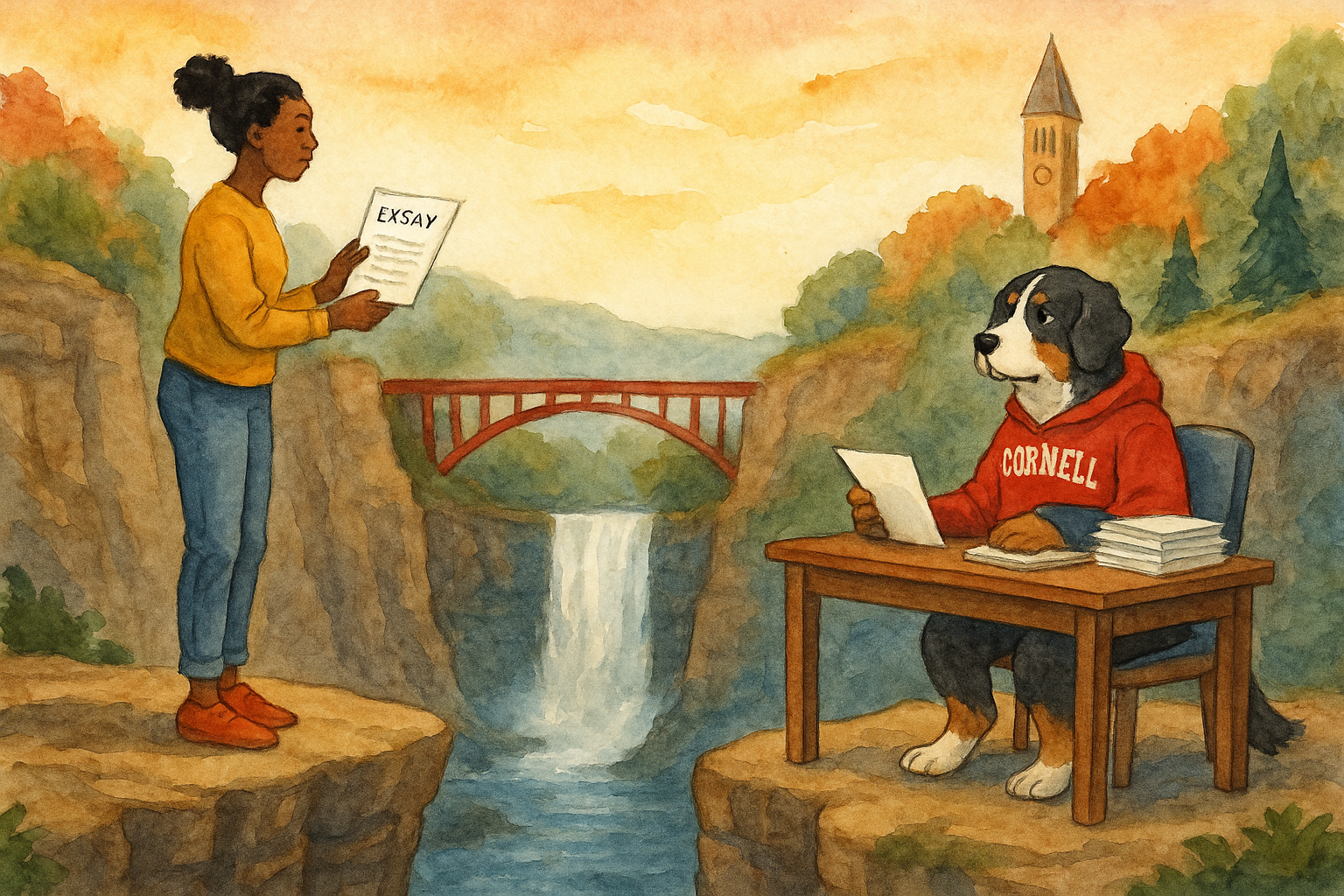
How to Write the Cornell Supplemental Essays and Get Into Cornell
Cornell’s supplemental essays are your chance to show that you’re more than just a strong GPA and test scores. This Ivy League school isn’t about quirkiness or eccentricity. Cornell loves students who are driven, disciplined, and practical—those try-hards who excel academically, participate in sports, contribute to their communities, and still make time for more. In short: Cornell is looking for students who embody effort and achievement. They want to know not just what you’ve accomplished, but also how your unique qualities and human experiences will shape and enrich their community of ambitious learners.
What Are the Cornell Supplemental Essay Prompts?
Prompt #1: Community and Contribution
In the aftermath of the U.S. Civil War, Ezra Cornell wrote, "I would found an institution where any person can find instruction in any study." For over 150 years, Cornell University has remained deeply committed to Ezra’s vision. Explain how your life experiences will help inform your contributions to a learning community devoted to “... any person … any study.” We encourage you to think broadly about your life experiences, including how local (e.g., family, school, neighborhood) or global communities you’ve been part of have helped shape your perspective. (350-word limit)
Pro Tip: This essay isn’t about being generic. It’s about showing admissions who you are in the most vivid, specific way possible.
- Think Beyond Labels: Instead of defaulting to an obvious group like your school, race, or religion, focus on a community that feels uniquely yours. Maybe it’s your late-night study group, the family dinner table, or the circle of kids who always showed up to clean the park.
- Paint a Picture: What’s the shared understanding that defines this community? Is it the language of resilience, like being part of a single-parent household where everyone pitches in? Or the shared humor of being a debate team underdog? Show the connection, not just the group.
- Reflect and Connect: Community shapes us, but it’s a two-way street. How have you made an impact? Maybe you’re the problem-solver, the motivator, or the one who lightens tough situations. Show how you’ll bring that energy to Cornell.
- Tie It to Cornell’s Values: Think "any person, any study." How will your community’s lessons shape your contributions to Cornell? Be specific—whether it’s joining the Public Service Center or fostering diverse perspectives in a seminar.
What Works:
- Details, Not Generalities: Don’t just say, “I learned teamwork.” Show it: "When my debate team had no coach, I organized practices and led warm-ups, which taught me to lead by example."
- Values in Action: Show how your community’s lessons have shaped your decisions and will influence your time at Cornell.
Prompt #2: College-Specific Essays
Cornell asks you to write an essay tailored to the college you’re applying to. Each college has its own unique prompt. Here’s how to approach them:
College of Agriculture and Life Sciences (CALS)
Why are you drawn to studying the major you have selected? Please discuss how your interests and related experiences have influenced your choice. How will an education from CALS specifically serve to support your learning, growth, and the pursuit of your goals? (650-word limit)
Pro Tip: CALS wants passionate doers who use science and innovation to tackle big challenges. This essay is about showing how your goals and experiences align with CALS’ mission.
- Focus on Hands-On Learning: Have you created your own experiments, worked on a farm, or volunteered for an environmental initiative? CALS values students who roll up their sleeves.
- Get Hyper-Specific: Mention opportunities like the Shoals Marine Lab or the Cornell Institute for Climate Smart Solutions. Tie these resources directly to your goals.
- Show How You’ll Grow: CALS isn’t just about what you’ve done—it’s about where you’re headed. Explain how CALS will help you make a bigger impact.
College of Arts and Sciences
Students in Arts and Sciences embrace the opportunity to delve into multifaceted academic interests, embodying Ezra Cornell’s founding vision. Tell us about the areas of study you are excited to explore, and specifically why you wish to pursue them in our College. (650-word limit)
Pro Tip: This essay is your playground for intellectual curiosity. Arts and Sciences loves students who think big and make unexpected connections.
- Find Your Crossroads: Maybe you’re fascinated by how philosophy shapes AI ethics or how environmental science can be informed by literature. Show how your interests intersect.
- Name-Drop Resources: Talk about specific programs or professors that excite you. For example, the Milstein Program in Technology and Humanity or courses like "The Science of Well-Being."
- Show Passion With a Purpose: Don’t just love a subject—show how you’ll use it to make an impact or fuel new ideas.
College of Engineering
Tell us about your interest in engineering or an engineering idea you have. Describe how your ideas and interests may be realized by—and linked to—specific resources within the College of Engineering. (650-word limit)
Pro Tip: Engineering isn’t just about solving problems—it’s about how you approach challenges. Make it personal.
- Your Unique Angle: What excites you about engineering? Is it the creativity of designing solutions, the teamwork in tackling challenges, or the thrill of testing prototypes?
- Show You’ve Done Your Homework: Reference Cornell’s unique resources, like the Engineering Leadership Program or labs like the Energy Systems Institute. How will these programs help you grow?
- Be Visionary: Tie your story to an engineering idea or a future goal—but make it specific. Cornell loves students who can dream big and execute.
SC Johnson College of Business
What kind of a business student are you? Using your personal, academic, or volunteer/work experiences, describe the topics or issues that you are passionate about, and how you envision these passions intersecting with your business education. (650-word limit)
Pro Tip: SC Johnson wants builders—students who know their strengths and use them to create meaningful change.
- Define Your Niche: Are you all about ethical supply chains, fintech innovation, or sustainable farming? Show how your passions set you apart.
- Tie to Real-Life Experience: Highlight how you’ve explored your interests already, like starting a small business or leading a community initiative.
- Make It Tangible: Explain how Cornell’s Business Simulation Lab or leadership workshops will take your ideas to the next level.
College of Human Ecology
How have your experiences influenced your decision to apply to the College of Human Ecology? How will your choice of major impact your goals and plans for the future? (650-word limit)
Pro Tip: Human Ecology values empathy, innovation, and tackling societal challenges. This is your chance to show how you’re wired to make a difference.
- Highlight Your Values: Maybe you’ve volunteered with underserved communities or researched urban planning solutions. Show how personal experiences fuel your goals.
- Focus on Action: Human Ecology loves problem-solvers. How have you already made a difference, and how will Cornell help you expand that impact?
- Leverage Unique Programs: Mention resources like the Design and Environmental Analysis program or faculty research that excites you.
School of Industrial and Labor Relations (ILR)
Tell us about your interest in ILR and how you plan to explore this interest at Cornell. (650-word limit)
Pro Tip: ILR is all about leadership, advocacy, and improving the workplace. Show how you’re ready to lead and learn.
- Show Your Perspective: ILR is about understanding and improving the dynamics of work and society. Share how your experiences have shaped the way you view labor relations, advocacy, or organizational behavior. Instead of listing leadership roles, explain how those experiences gave you insight into how people interact, collaborate, and thrive in workplaces.
- Tie to Social Justice: ILR loves students passionate about equity. How have your experiences shaped your commitment to making the workplace fairer?
- Be Specific: Reference ILR’s unique opportunities, like the Scheinman Institute or Global Scholars program, and how they align with your goals.
Conclusion
Writing your Cornell supplemental essays is all about showing the admissions team that you’re not just a stellar student—you’re a whole person with unique perspectives, experiences, and ambitions. From your community connections to your academic passions, every part of your application should tell a cohesive story of why you belong at Cornell.
Here’s the key: Be specific, be genuine, and don’t be afraid to show how you think and see the world. Whether you’re dreaming of creating sustainable farming solutions, tackling workplace equity, or finding the crossroads between philosophy and AI, make it clear that Cornell is the place where your vision will thrive—and that you’ll make the campus better just by being there. Remember, this isn’t about checking boxes or impressing with big words. It’s about crafting an authentic narrative that ties together who you are, what you’ve done, and what you’re going to achieve.
And if you’re feeling overwhelmed? Remember that this process is as much about discovery as it is about writing. Take a deep breath, lean into your story, and trust that your hard work will pay off. Cornell is waiting to hear from you.
Edit this block to edit the article content or add new blocks...

Post a comment